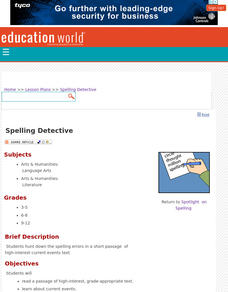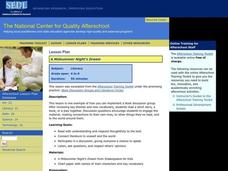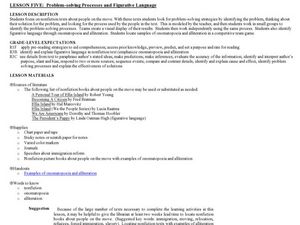Hood River County School District
Text Structure: Features and Organization
Teach learners how to interact with both fiction and non-fiction text with a packet of activities and worksheets. After looking over text structure and the difference in text features between different types of writing, readers analyze...
Gwinnett County Public Schools
Analysis of the Tuck Everlasting and The Birchbark House Text Exemplars
Looking to introduce some text-based questions into your ELA lessons? Practice the kinds of skills the Common Core demands with the seven text-based questions and the essay prompt provided here. Designed to be a three-day lesson, day one...
Curated OER
Vocabulary through Text
Explore word meanings. Sixth graders identify examples of words with affixes while listening to the story Paul Bunyan by Steven Kellogg. They participate in the game "Pass the Parts" and practice separating given words into their root...
Teacher Web
Inferring Character Traits
Learning how to draw inferences from text is a key reading comprehension skill. Here's a worksheet that gives readers a chance to practice by offering 20 descriptive sentences and asking kids to identify the inferred character trait, and...
Novelinks
The Giver: Biopoem
The characters in Lois Lowry's The Giver are rich and complex as they weave their way through the plot. Examine the character traits of one chosen person with a biopoem, which enables learners to follow a poetic format in writing a...
Curated OER
Narratives
Add to the narrative writing experience. Elementary or middle school writers listen to the teacher read a descriptive passage, then reread the same passage silently. They highlight sensory details and figurative language, then orally...
Curated OER
Identify Intended Media Messages
How does media convey different messages? Use this lesson to explore media by identifying and analyzing selected images. Middle schoolers analyze a poster and discuss the intended meaning of the imagery and how it makes them feel. They...
Scholastic
Follow the Clues
Invite your text detectives to bring their magnifying glasses to school to examine the clues in a text and make predictions. They write down three clues and a prediction on the graphic organizer.
Student Achievement Partners
Eleven
Turning 11 comes with a range of emotions. Explore those emotions by reading the short story "Eleven" by Sandra Cisneros. Readers analyze the main character's reactions to the events of her day. Then, they write an essay describing what...
Student Handouts
Why Does an Author Write?
To get to the heart of a writer's purpose, just remember to have some PIE (Persuade, Inform, or Entertain)! And appropriately, here is a PIE chart that leaves room for pupils to identify each letter of the acronym and any other ideas or...
Curated OER
Dear Diary
Work on narrative writing with this lesson, in which middle schoolers analyze the characters from a selected piece of literature and write narrative diary pieces as the character. They work to understand the point of view of the...
Curated OER
Go Free or Die
Groups of older elementary learners begin their study of figurative language by visiting a website and completing the exercises detailed there. They then apply what they have learned by finding examples in several poems. Finally, they...
Curated OER
Spelling Detective
Put on your Sherlock Holmes hat and become a spelling detective! Scholars hunt down the spelling errors in a short passage of a high-interest current events text. Here is a great way to develop editing and reading skills.
Curated OER
Hatchet: Vocabulary Strategy
Want your class to use critical thinking when discussing vocabulary? Go beyond the dictionary with a vocabulary activity based on Gary Paulsen's Hatchet. Kids write the word in the center of a graphic organizer that also provides places...
Curated OER
Theater: Create a Script
Figurative language is the focus in the book Teach Us, Amelia Bedelia. After reading Peggy Parish's book, class members dramatize idioms from the text, using dramatic strategies such as characterization, exaggeration, and improvisation....
Scholastic
What a Character!
How do you know what traits a character displays in a story? Learners select a character and find list three traits for this character, explaining why they chose each trait. They then put this information together into a paragraph or essay.
Reed Novel Studies
I Am David: Novel Study
Many people dream of getting a fresh start or starting over again. David, a main character in I am David, gets that chance and must learn to live life outside of the concentration camp. Scholars read about David's adventures as they...
Curated OER
A Midsummer Night's Dream
Students explore the book A Midsummer Night's Dream. In this literature lesson, students identify main characters and vocabulary words from the text. Students participate in a book discussion group.
Curated OER
Author's Purpose Lesson Plans
Why do we practice identifying the author's purpose? Read this article to gain a better understanding of this reading strategy, and then peruse the attached lesson plans!
Curated OER
Historical Agency in History Book Sets (HBS)
Study historical events by combining the study of historical fiction and non-fiction. Learners read about true past events in historical fiction novels and then research non-fiction accounts of the same events. What are some differences...
Curated OER
Problem-Solving Processes and Figurative Language
Nonfiction texts about people on the move provide young readers with an opportunity to examine not only the problem-solving strategies employed by immigrants, but to also find examples of figurative language these writers use to tell...
Curated OER
Acrostic Book Report
Young scholars read the story Wild Horse Winter and construct acrostic poems. In this poetry lesson, students use adjectives and events in the text to develop an acrostic poem.
Curated OER
A Christmas Carol - Charles Dickens
Students study and explore the portrayal and development of a major character in a novel from the novel, "A Christmas Carol," by Charles Dickens. They identify words and phrases that effectively describe the main character in this novel....
Curated OER
Blanket the Plains
Students discuss vivid imagery in a story. In this figurative language lesson, students read samples of sensory language and then discuss the meaning of a piece of figurative language. Students provide examples.

























